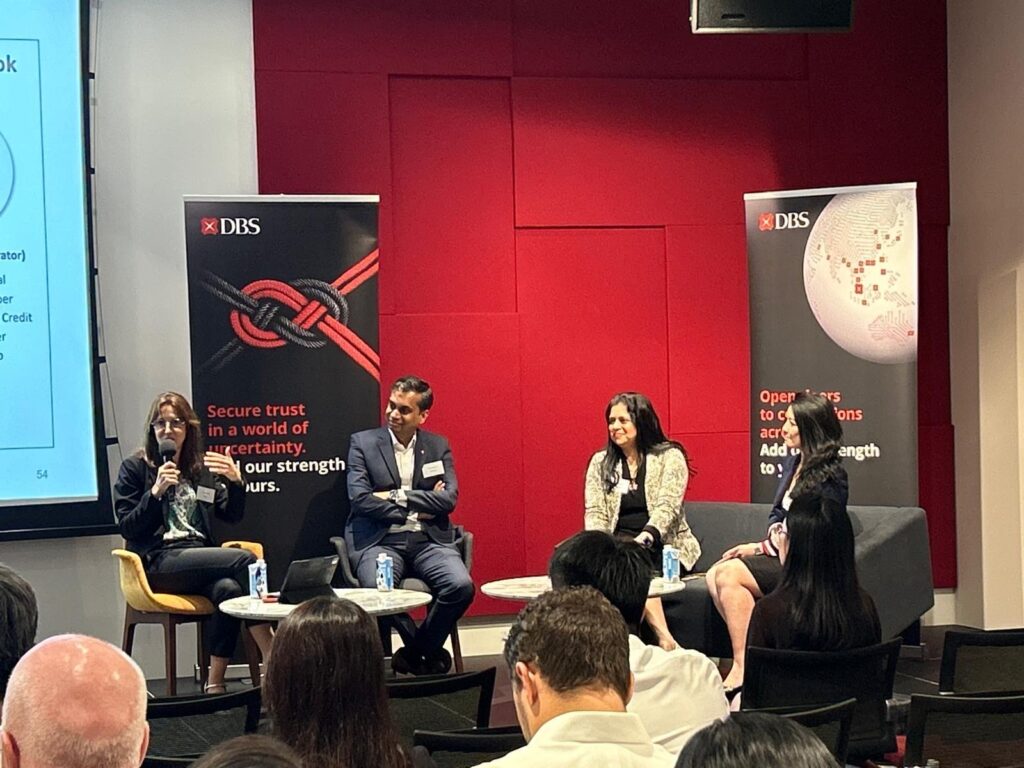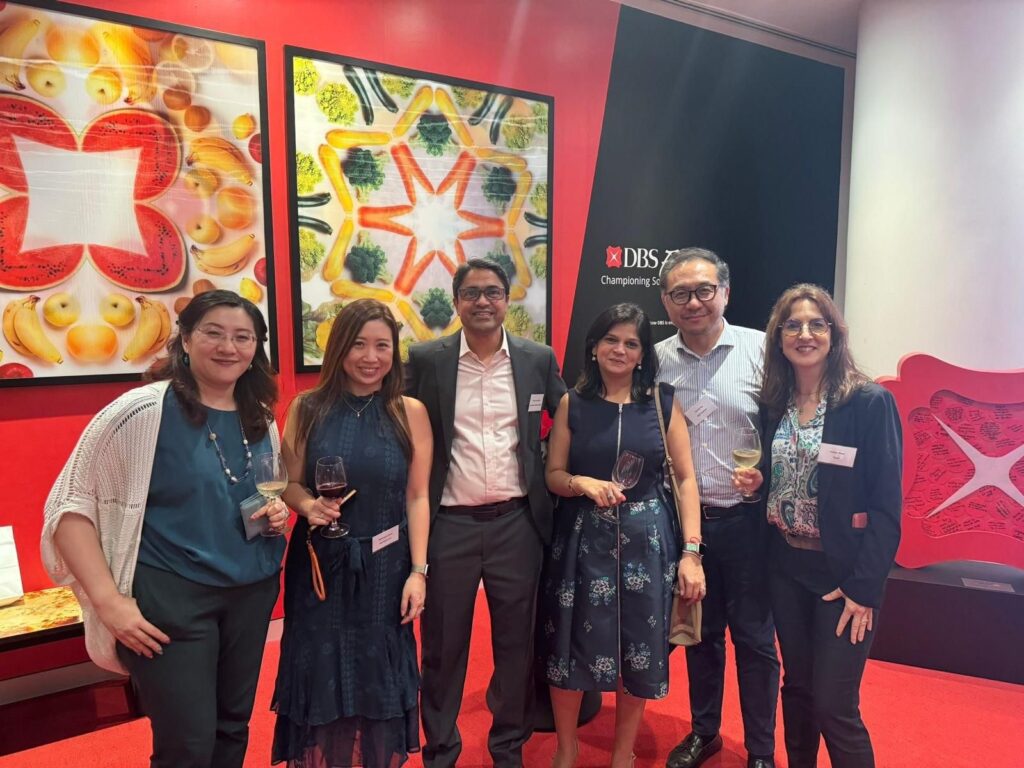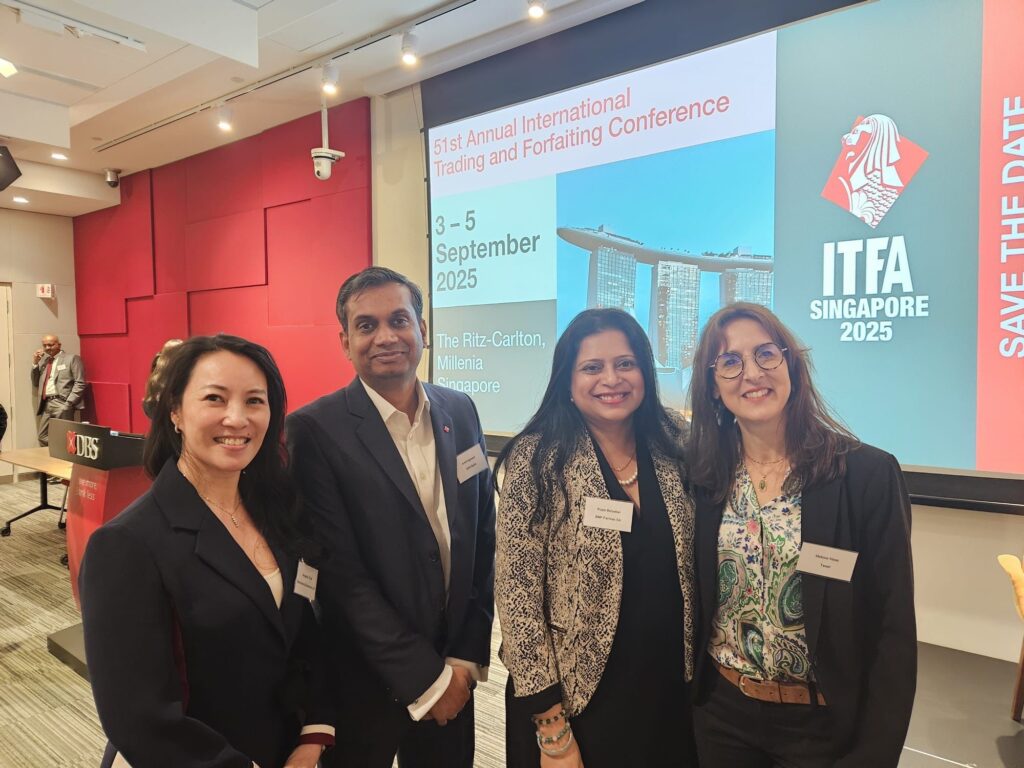-
 ITFA represents the rights and interests of banks, financial institutions and service providers involved in trade risk and asset origination and distribution.Our Mission
ITFA represents the rights and interests of banks, financial institutions and service providers involved in trade risk and asset origination and distribution.Our Mission
ITFA’s SEARC Event – What to expect in 2025 for Trade Finance in Asia
Contributed by ITFA SEARC (South East Asia Regional Committee)
ITFA SEARC was delighted to welcome ITFA members in Singapore on January 23, 2025 at DBS Auditorium, for the first physical event of the year, discussing What to Expect in 2025 for Trade Finance in Asia.
The event began with an inspirational keynote speech from Sriram Muthukrishnan, MD & Group Head of Product Management, Global Transaction Services at DBS Bank. He highlighted: “Competition drives us to innovate, but collaboration allows us to navigate complexity and address shared challenges. By working together, whether in risk distribution or advancing digital capabilities, we can strengthen the trade finance ecosystem and ensure it remains resilient and agile in an ever-changing environment.”
This was followed by an update on ITFA’s ongoing efforts and contributions to strengthen the global trade finance ecosystem, delivered by Chris Hall, Board Member of ITFA and Global Head of Financial Institution Sales, Credit and Political Risk Insurance at WTW.
Jin Tik Ngai, CFA, VP Senior ASEAN Economist at JP Morgan, then provided an insightful session on the 2025 economic outlook, discussing key trends and the potential impact of Donald Trump’s policies on Asia and ASEAN economies.
A panel discussion, moderated by Helene Heas (ITFA SEARC member and Structured & Trade Credit Insurance Broker at The Texel Group), explored how 2024 unfolded for the trade finance community in Asia and the opportunities ahead in 2025.
The distinguished panelists included:
The discussion highlighted that change, innovation, and evolution are essential tools for navigating today’s volatility and complexity.
Our engaging emcee, Neha Noronha (ITFA SEARC member and Unit Head, South Asia – Trade and Supply Chain Finance at Asian Development Bank), kept the audience energized throughout the event.
Vipin Vashishta, Daniel Ng, Helene Heas, Neha Neronha, Sijia Lin, Stephanie Choo and Sophie Zhong



ITFA ARC Educational Webinar & ITFA ARC Working Group Virtual Forum, January 2025
Written by Tedd George, Kleos Advisory UK, February 2025
ARC Educational Webinar – Outlook for Country Risk in Africa and its Impact on Trade and Trade Finance
On January 28th ITFA’s African Regional Committee (ARC) held its first educational webinar of 2025, exploring the outlook for country risk in Africa and the impact it could have on trade flows and trade finance. The webinar was a two-hander, hosted by Dr Tedd George (ARC Secretariat) with guest speaker Robert Besseling (CEO at Pangea Risk), and was well attended, with over 150 registrations and 70 attendees.
Robert opened the webinar with a presentation on the outlook for country risk in Africa and its potential impact on trade. Robert noted the growing importance of the BRICS (now including six African countries) which not only account for 45% of the world population but which have overtaken the G7, representing 34.9% of world GDP (at PPP) versus 30.5% for the G7. He also explored Africa’s importance as a source of critical minerals for latest generation of tech, including iridium (88.9% of global supply), platinum (73.6%), cobalt (70%) and manganese (35.8%). Major investment in infrastructure is underway to exploit these resources, notably the Benguela Railway which now stretches across Angola’s Western border into the DRC and which could soon have a link into Zambia.
Looking at political risk, Robert noted that there had been no successful coups in 2024, although the ‘Coup Belt’ stretching across the Sahel remains an unstable area and three countries, Burkina Faso, Mali and Niger, intend to withdraw from ECOWAS, fuelling instability across the region. Nonetheless, there is a positive outlook for two of Africa’s largest economies, Egypt and South Africa, where the risk is going down, and Senegal, whose outlook has improved following its positive engagement with the IMF.
Robert’s presentation was followed by Tedd who presented on the outlook for trade flows across Africa and the key challenges and opportunities for trade finance. Tedd noted the multiple risks to African trade, from the impact of climate change and La Niña on crops, to0 the volatility of commodity prices (especially cocoa) and the ongoing disruption to shipping caused by the Red Sea Crisis. Nonetheless, African trade flows have continued to grow, reaching an estimated USD 1.4 trillion in 2023, dominated by SADC and COMESA, producing a trade deficit of nearly USD 80 billion. But the picture varies greatly from country to country, with Egypt, Morocco and Kenya running large trade deficits, while Côte d’Ivoire, Nigeria and Ghana have a roughly balanced trade account, and Algeria runs a large surplus.
Following the two presentations, Tedd & Robert held a fireside chat, sharing their views on each other’s presentations and unpacking the issues further, followed by an online Q&A. A major theme was the potential impact of the Trump administration’s protectionist trade policies on African exporters and investment flows. Robert noted the damage that winding down AGOA could have on certain sectors, notably South Africa’s car industry, while he anticipated more aggressive American interest in Africa’s strategic minerals. But Tedd warned that the USA needs to tread carefully in Africa as it does not have the same economic clout there as it does in other regions of the world, such as Western Europe or Asia. In 2023 the USA was only the fourth largest exporter to Africa (5.6% of total flows) and fifth largest importer of African goods (3.7%), far outpaced by the EU, China, India and the UAE, and if Washington is not careful how it handles Africa it could end up losing more influence to these countries which have far stronger trade ties.
If you were unable to attend this webinar, or would like to watch it again, the recording is available here on the members area of the ITFA website, along with recordings of previous webinars in the series, with topics ranging from sustainable trade finance and trade finance instruments to operational risk and insurance.
Look out for the next educational webinars in this series later this year, which will include a cross-regional webinar with the Middle East Regional Committee (MERC), focusing on trade links between SSA and MENA, and a refresher on ‘How to structure a deal in Africa’.
ITFA ARC Working Group Virtual Forum on SME Trade Finance
On January 30th ITFA’s African Regional Committee (ARC) held the inaugural Virtual Forum of its Working Group on SME trade finance. This virtual forum was aimed at all ITFA members, especially those involved in financing or underwriting trade in Africa, as well as the wider trade finance community.
The ARC Working Group on SME trade finance was created in September 2024 to address the most persistent problem facing African traders and their banks: the trade finance gap, which has been estimated in Africa at over USD 130bn per year. Drawing on financial professionals from across ITFA’s membership, including DFIs, multinational, pan-regional and local African banks, NBFIs and fintechs, the ARC WG is developing solutions to close the trade finance gap that can be rolled out to the market and scaled. The WG’s work is closely aligned with the mission and ambitions of the Trade Finance Conference of Parties (TF COP), which was held at the IFC’s headquarters in Washington, DC, in October 2024.
George Wilson (ARC Chair) opened the Virtual Forum with discussion of the rationale and mission of the WG, emphasising its focus on fostering two-way dialogue with Africa in order to identify the key challenges for SME traders and develop tailored solutions to address them. This was followed by a presentation by Dr Tedd George (ARC WG Secretariat) and Ahanna Anaba (ARC WG Lead) on the ARC Working Group, its focus and membership. Tedd explored the causes of Africa’s gaping trade finance gap, the disconnect between the DFIs/multinational banks and the local African banks and their SME clients, and how the ARC WG’s efforts will feed into the planned TF COP Task Force. Ahanna then shared the results of surveys carried out by the ARC WG, noting the mismatch between what clients are demanding (e.g. receivables financing) and what the banks are offering them (mostly overdraft facilities).
Next there was an overview of the three work streams of the ARC WG: Legal & documentation, by Shona Tatchell (EBRD); Financial products, by Kevin Holmes (RMB); and Fintech, by Ahanna Anaba (Finverity). All three work streams are focused on identifying the challenges facing African SME traders and developing specific tools to meet their needs, from standardised legal documentation to bespoke financing products and tech solutions.
The final part of the Virtual Forum was an expert panel discussion, moderated by Tedd, with Richard Lubira, Head of SCF & Stock Finance at I&M, and Oluwole Ajiboye, Head of Commercial Finance at Guinness Nigeria. Wole noted the many financing challenges in Nigeria, notably around obtaining sufficient FX and managing fluctuations in the value of the Naira, which prior to last year’s devaluation could change dramatically from day to day. This means developing solutions that enable suppliers to get paid right away. But a big challenge is overcoming the conservative approach of farmers and cooperatives who do not trust new tech solutions and who need to change their mindset.
Richard emphasised the importance of co-creation with vendors and traders in the supply chain; there’s no point pushing out products that don’t work in the African SME context. He described various solutions I&M has deployed to SME traders, including faster onboarding & turnaround times, an in-house platform for stock financing and an SCF platform for reverse factoring and receivables financing. Both Wole and Richard noted the need to build the resilience and technical capacity of SME traders who often don’t know how to calculate their own WC needs.
The Virtual Forum ended with an audience Q&A and a call by the ARC Chair, George Wilson, to support the ARC’s work and engage more African SME traders and their banks.
If you were unable to attend this Virtual Forum or would like to watch it again, the recording is available here on the members area of the ITFA website. And look out for the next Virtual Forum which will be held in Q2 25.
Privacy Policy | Cookie Policy
Designed and produced by dna.studio